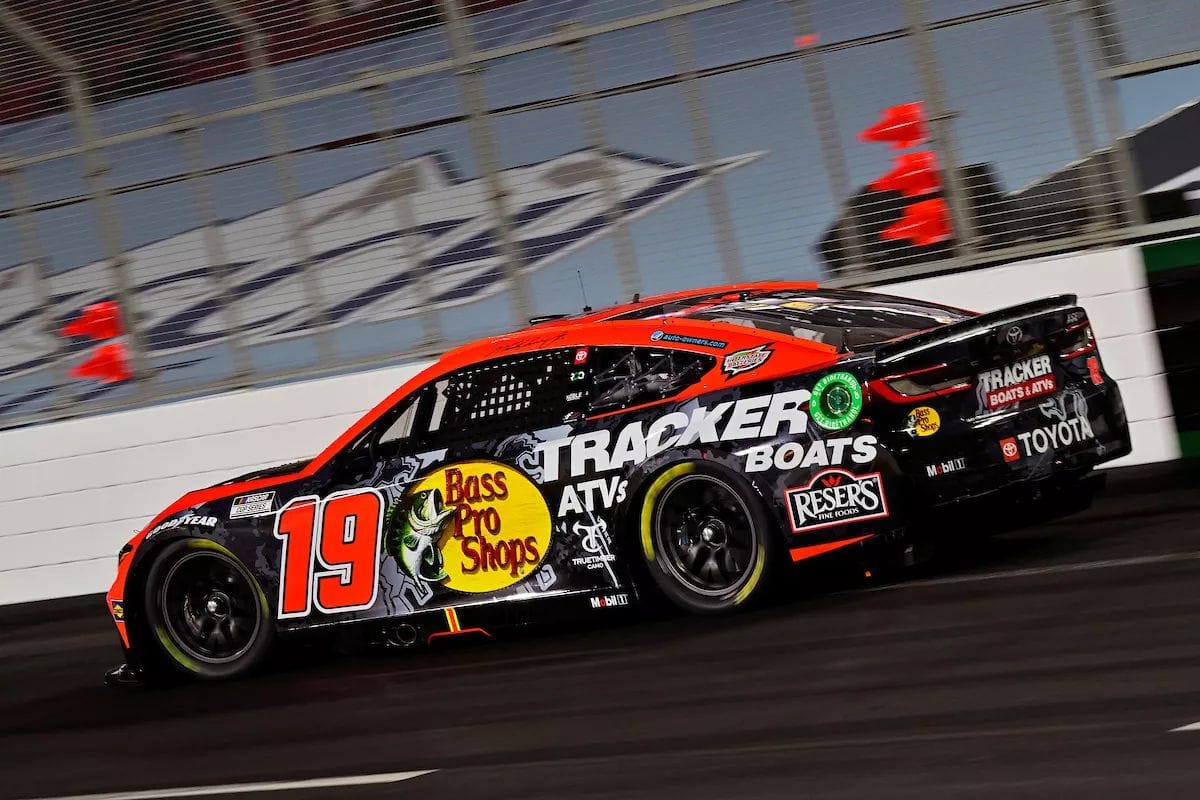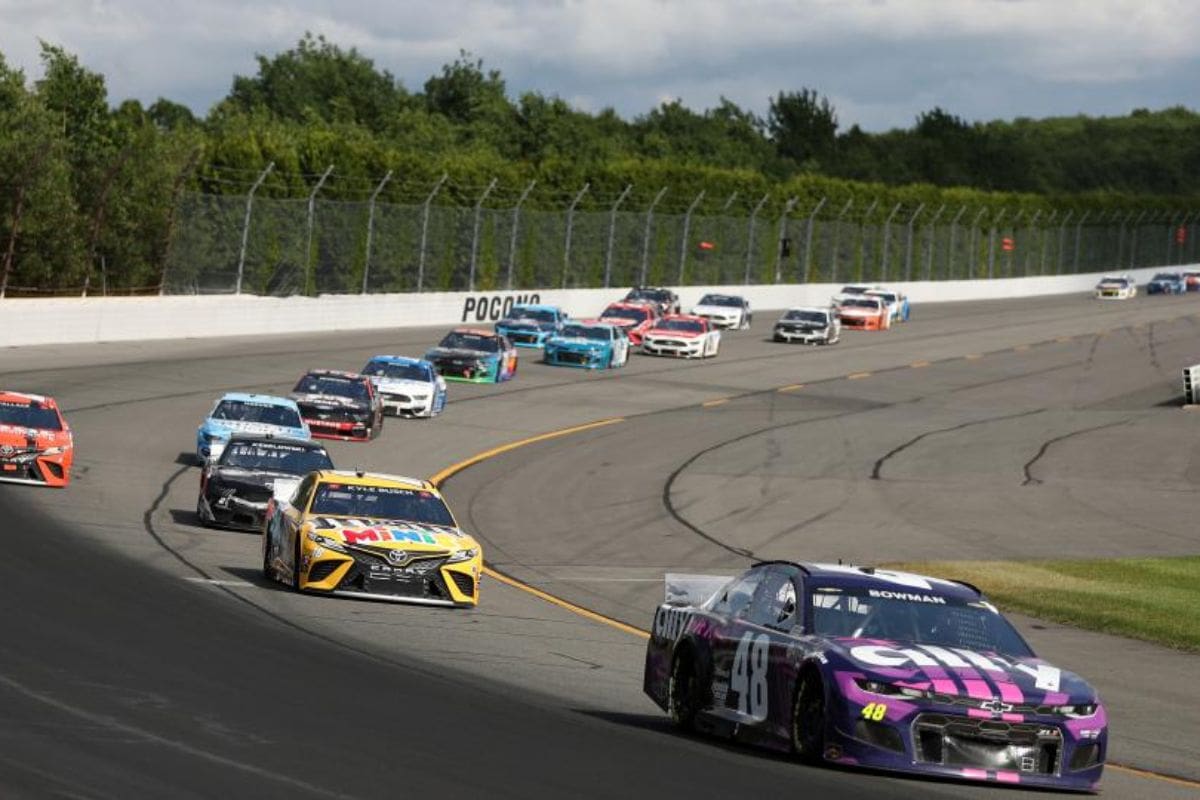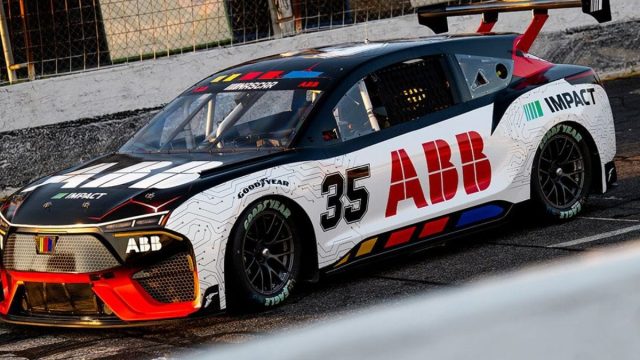NASCAR Senior VP’s Electric Car Promise: NASCAR’s Senior Vice President has recently made a groundbreaking promise that has left the motorsports community in a state of shock and curiosity: the imminent introduction of electric cars into NASCAR’s lineup. This move is not just a nod to sustainability but a potential redefinition of the sport’s very essence. As insiders grapple with the implications of this shift, questions abound regarding fan reception, the performance of these vehicles, and the viability of such a transformation in a tradition-steeped arena. These uncertainties set the stage for an intriguing exploration of NASCAR’s future course.
Key Highlights
- NASCAR’s Senior VP committed to integrating electric cars into the racing circuit, surprising many veteran insiders.
- The promise reflects NASCAR’s strategic move towards sustainability and reducing carbon emissions.
- The new electric car features 1300 horsepower and a 78.0 kWh battery, highlighting significant performance potential.
- The announcement has ignited a debate on balancing tradition with innovation within the motorsports community.
- This commitment is seen as a pivotal moment for NASCAR, embracing eco-friendly practices and future technological advancements.
NASCAR Unveils First Electric Car
NASCAR has introduced its initial all-electric car, signaling a new era of environmentally conscious motorsport. This calculated step aligns with global pushes toward sustainability, emphasizing the reduction of carbon dioxide emissions in sports. As the world grapples with climate change, NASCAR, traditionally known for its roaring engines and high-speed thrills, is embracing a groundbreaking approach to racing.
The all-electric vehicle represents more than just a technological advancement; it embodies NASCAR’s dedication to innovation and environmental stewardship. Unlike their gasoline-powered counterparts, electric race cars promise to deliver comparable, if not superior, performance metrics. Instant torque, rapid acceleration, and a quieter, more efficient powertrain are just a few of the remarkable benefits. By eliminating the combustion process, these vehicles greatly decrease the carbon footprint associated with motorsports.
NASCAR’s decision to introduce an electric model is not merely a nod to global trends but a decisive action that demonstrates leadership in the industry. The development of this vehicle has involved meticulous engineering and substantial investment in research and development. NASCAR’s engineers have worked tirelessly to make sure that the electric car meets the rigorous demands of professional racing, balancing speed, durability, and sustainability.
This introduction has the potential to reshape the racing landscape, inviting both enthusiasm and scrutiny. While traditionalists may view this as a departure from the essence of NASCAR, forward-thinking stakeholders see it as a vital evolution. The electric car’s debut promises to redefine what it means to be a competitive racing entity in the 21st century, setting a precedent for motorsports worldwide.

Fan Backlash and Controversial Promotion
The debut of NASCAR’s inaugural electric vehicle has sparked significant backlash among fans, many of whom have voiced their disapproval and threatened to abandon the sport. A notable portion of the NASCAR community, traditionally grounded in the visceral roar and scent of gasoline engines, perceive the shift to electric vehicles as a betrayal of the sport’s legacy. Statements from long-time fans such as, ‘The day this hits the track I’m done,’ highlight a deep-rooted resistance to this technological advancement.
The emotional intensity of this backlash is further heightened by the contentious remarks from John Probst, NASCAR’s chief racing development officer. Probst, in his efforts to endorse the electric vehicle (EV) initiative, made statements that many found perplexing and disconnected from the core fanbase. Even Freddie Kraft, an experienced spotter, was surprised by Probst’s comments, indicating a potential gap between NASCAR’s leadership and its most devoted supporters.
In the face of this polarized reception, NASCAR finds itself at a crossroads. The organization must navigate this change delicately, balancing the necessity of environmental sustainability with the zeal and allegiance of its fanbase. How NASCAR addresses these concerns will unquestionably shape the future course of the sport.

NASCAR Faces Criticism for Absurd Promotion Tactics of EVs
Unveiling their first electric car in Chicago, NASCAR‘s collaboration with Chevrolet, Toyota, Ford, and ABB was overshadowed by a marketing strategy that left many fans puzzled and critical. The prototype, valued at a staggering $1.5 million, aimed to indicate NASCAR’s dedication to reducing its carbon footprint. However, the promotional approach, led by Senior Vice President of Racing Innovation, John Probst, raised eyebrows and sparked debate.
Probst’s proposal that electric racing could be revamped by incorporating a DJ into the races struck many as a poorly planned effort to modernize the sport. This unconventional suggestion seemed to undermine the authenticity and legacy that many NASCAR enthusiasts treasure.
Freddie Kraft, a prominent figure in the NASCAR community, openly criticized the marketing tactics on the podcast Door Bumper Clear. Kraft pointed out the gap between NASCAR’s traditional audience and the suggested futuristic spectacle. He emphasized that the excitement of electric cars lies in their impressive performance capabilities, not additional distractions like DJs.
“If you want to get our fan base excited about this electric car coming, this isn’t it. But let me tell you what they’re gonna do, and I learned this out the hard way when I got in TJ’s Tesla – these cars are gonna haul a**.” – Kraft
NASCAR’s desire to innovate and evolve is praiseworthy, but the implementation of their marketing campaign reveals a need for a more refined approach. By aligning the promotion of electric vehicles with the fundamental values of the sport—speed, engineering excellence, and competitive spirit—NASCAR could cultivate greater acceptance among its devoted fan base.
Imagine a NASCAR EV race with DJ Brett headlining – but be honest, would you go? 🔊🔌😂 pic.twitter.com/gVjMEx8ljl
— Dirty Mo Media (@DirtyMoMedia) July 9, 2024
Fan and Driver Reactions
Amid the ambitious push towards electric vehicles, how are fans and drivers reacting to NASCAR’s bold vision for a sustainable future? The landscape of motorsports is being redefined, and reactions are as diverse as the competitors on the track.
Kevin Harvick, a seasoned driver, has voiced his skepticism, reflecting a sentiment shared by many traditionalists within the fan base. Harvick’s reservations echo the concerns of those who fear that the roar of internal combustion engines—a quintessential element of NASCAR’s identity—might be silenced.
On the other hand, Dale Earnhardt Jr., a revered figure in the NASCAR community, strikes a more curious yet cautious tone. While he doesn’t foresee the Truck, Xfinity, and Cup Series being supplanted by an all-electric series anytime soon, he acknowledges NASCAR’s broader sustainability goals. Earnhardt’s stance reflects a detailed understanding that while the immediate future may not pivot entirely to electric vehicles, incremental steps towards sustainability are inevitable and necessary.
Fans, too, are divided. A substantial portion remains resistant, holding onto the visceral experience of traditional racecars. The skepticism is not merely about the cars themselves but also concerns over whether the essence of NASCAR can endure such a transformation.

The Vegan Electric Car and Its Performance
In an unprecedented move towards sustainability, NASCAR has introduced a vegan electric car that redefines performance and environmental consciousness in the sport. This innovation is not merely a statement; it is a reflection of NASCAR’s commitment to merging high-octane racing with eco-friendly initiatives.
The body of the electric vehicle (EV) is crafted from plant-based materials rather than traditional carbon fiber, ensuring that the car is both robust and environmentally sustainable. However, the true marvel lies beneath the hood. The EV boasts an extraordinary 1300 horsepower—almost doubling the 679 horsepower delivered by the current V-8 engines in next-gen cars. This remarkable power is supported by a 78.0 kWh battery and regenerative braking technology, which NASCAR believes is ideal for their focus on short tracks and road courses.
Introducing ZETA Member⚡️ @ABBNorthAmerica's @NASCAR EV Prototype, designed for speed and powered by innovation.
🏎️⚡ This prototype shows that sustainability has the potential to compete with some of the very best! 🌍 #ABB #NASCAR #NASCARChicago #ElectricRacing pic.twitter.com/hMbsHOcO6m
— Zero Emission Transportation Association (@zeta_2030) July 9, 2024
Despite its silent operation—a feature that has been met with mixed reactions from drivers like Kevin Harvick—the car’s performance metrics are undeniably impressive. David Ragan, who test-drove the vehicle, noted that it is ‘two-tenths of a moment slower’ than its gas-powered counterparts, a negligible difference given the broader environmental benefits.
News in Brief : NASCAR Senior VP’s Bold Electric Car Promise
The introduction of electric vehicles in NASCAR, marked by a bold promise from the Senior VP, has catalyzed a crucial transformation in motorsports. This move emphasizes a commitment to sustainability and innovation, despite fan backlash and controversial promotional tactics.
The reactions from fans and drivers highlight a divided sentiment, while the performance of the vegan electric car remains a focal point of interest. The evolution of NASCAR’s approach to high-performance racing will unquestionably reshape the future of the sport.
ALSO READ: Cole Custer Ends Win Drought in Epic Pocono Victory
